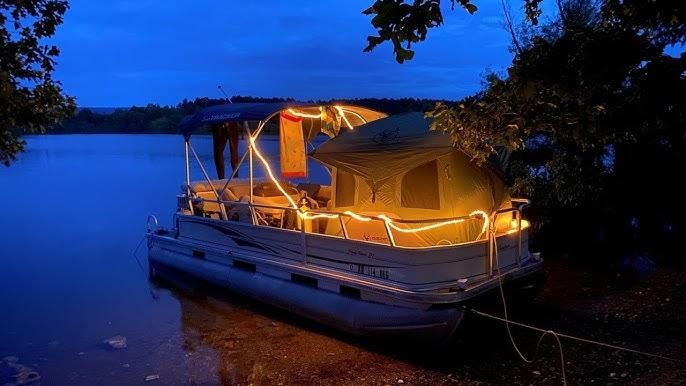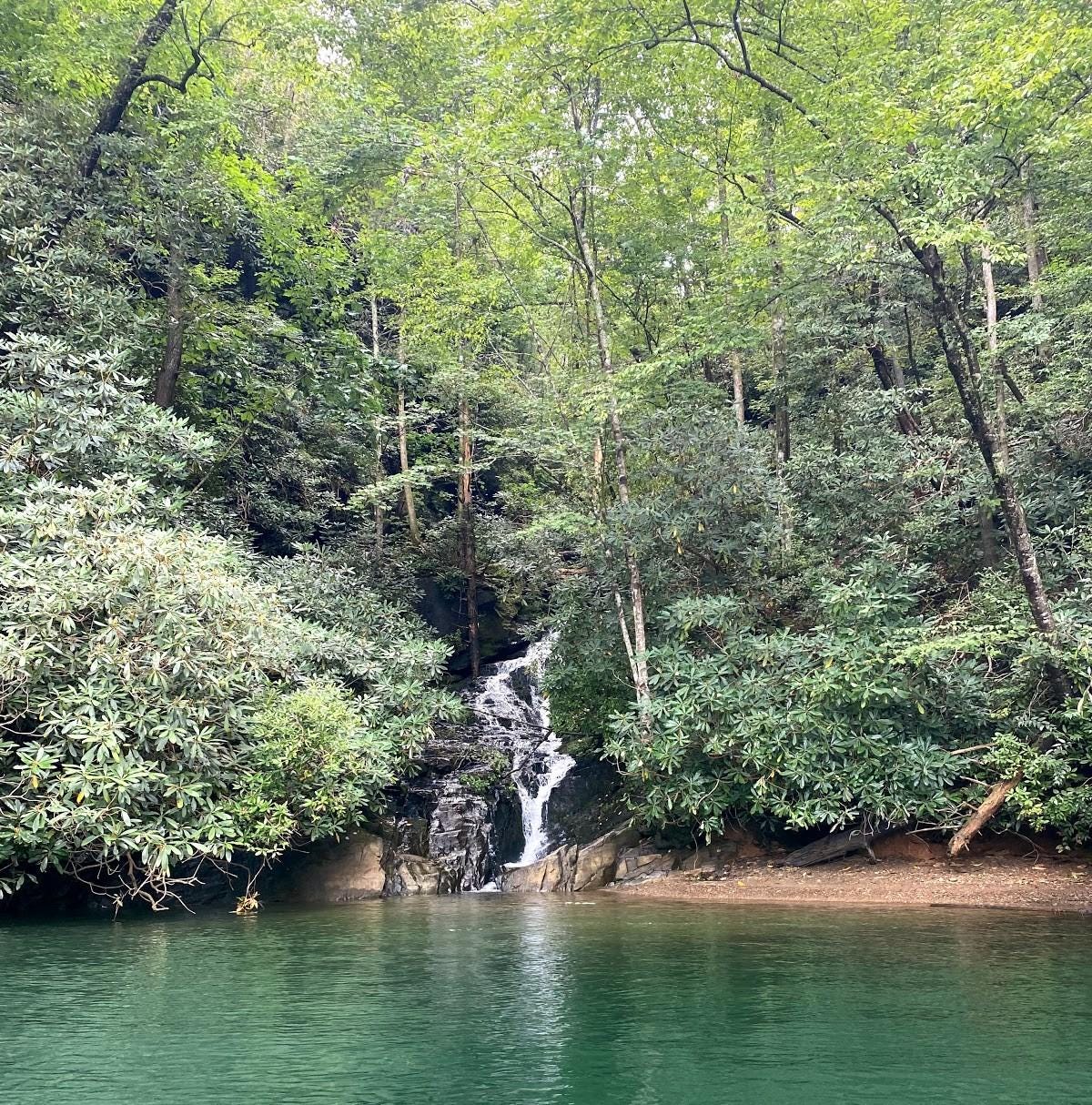When your vacation tries to kill you...
a guest post by Heather Wall of Natural Wonders newsletter
Delighted to host a fellow travel adventurer and admirer of wildness, Heather Wall of Natural Wonders newsletter on Substack! She wrote this fun essay and you can check out her Natural Wonders newsletter as well.
There was a period in my life when every vacation felt like it was out to kill me.
Whether it was too-close bear encounters or rock-climbing adventures or mountain biking wrecks that took us to the local hospital, we always ultimately survived and had great stories to share with our friends.
Years ago, my husband, Andrew, and I decided to take up diving as our newest sport. We live in the North Georgia mountains, far from the crystal rivers and reefs of Florida, but we had a trip planned to John Pennekamp State Park to see some wrecks and sharks and actual coral.
To prepare, we planned a short trip to the best diving lake in the area, Lake Jocassee in the northern foothills of South Carolina. Jocassee is a clear mountain lake tucked under North Carolina’s mountainous chin, a wild and scenic lake with no human habitation along its forested shoreline. It’s where locals go for their check-out dives and to participate in festivals like the October underwater pumpkin-carving contest and staged treasure hunts for gold coins sprinkled along the rocky bottom.
Across from the main boat ramp, the lake fills up an abandoned rock quarry laid out in giant stair steps that descend 360 feet to the dark depths. Along one of those terraces lays a Chinese junk that makes for adventurous diving.
None of that is what almost killed us, however.
Andrew and I had bought a pontoon boat and outfitted it specifically for diving by removing all the front benches. This left a space perfectly proportioned for pitching a tent to sleep in after an exhausting day of diving.
On this particular day we dove for hours in the quarry with a friend and, after dropping him back off at the boat ramp to drive home, we motored our pontoon up into a secluded arm of the lake. We anchored along the shore, not a house in sight, and pitched our tent on the front deck of the boat.
As we ate our cold sandwiches and watched the sun descend past the horizon, we began to hear static on the radio. This turned into flashes of heat lightning in the distance once dusk settled around us.
We were suddenly very aware of the fact that we were sitting on an aluminum boat on a conductive surface of water. After a bit of debating, we decided we’d just mosey on back toward the open-water part of the lake “in case” we needed to get across to our truck at the boat ramp.
As we slowly motored along the finger of the lake, the wind began to pick up. Thunder rumbled overhead, the flashes of lightning an almost constant barrage across the sky. By now it was pitch-black and we could only see about twenty feet into the dark with our handheld spotlight.
As we rounded the last corner that opened up into the body of the lake, we were suddenly hit by the full brunt of the wind and the arrival of the rain. The engine surged but made little progress in the face of driving rain and the swelling waves.
“What about the tent?” I yelled into the wind, as Andrew struggled to keep the boat moving forward. I pointed to the front of the boat, where the tent was threatening to take flight.
“Go up front and hold it down!” he yelled, then, “WAIT! Put on a lifejacket!”
We each scrambled into the lifejackets we only carried to keep DNR happy – I’m not sure we’d ever put them on before. I crept up to the front of the boat and straddled the front gate, one hand on the tent, the other on the boat railing.
By this time, we were in the center of both the lake and the storm. Our boat was sliding down waves bigger than we’d ever experienced – as we crested each wave, the engine would rise out of the water as we tipped forward to slide down the other side. At the bottom of the trough, the front platform of the pontoon boat scooped into the next wave, washing three or four inches of water over my feet, into the tent, and around our gear to the drain hole in the back.
“You doing ok?!” Andrew yelled to me as he frantically tried to keep the boat pointed into the wind to prevent it from flipping.
“Sure am!” I tried to yell cheerfully, but it came out as a scream, as my legs bounced uncontrollably underneath me with what rock climbers call “sewing machine” legs. I looked desperately to shore, hoping someone could see our pinprick of a spotlight, but shore was too far away to see clearly. And amid the constant lightning, no one would probably notice it anyway.
I thought ahead to the next morning, when our waterlogged bodies would drift ashore and someone from the campground would say, “You know, I wondered if I saw a light out there last night, but then I thought – no one’s crazy enough to go out in that!”
All those people curled up in their tents on land, probably hating the fact that their gear was getting wet and soggy – they had no idea how good they had it.
Would we ever make it out of this?
Andrew kept the spotlight trained on the dive flag whipping from our boat canopy – it was the only way he could tell where the wind was coming from to keep us from capsizing.
“We’re doing great!” he’d yell toward me, and I’d yell back, “Yep!” while my legs rattled beneath me and the boat slid up each mountain and then down the other side.
After what seemed like hours but was probably 45 minutes, land appeared to our right and the wind died back somewhat. We found a rhododendron tree to tie off to and dropped anchor, exhausted and yet ecstatic that we had made it.
“We’re alive!” we screamed, jumping up and down while high-fiving and hugging each other.
We collapsed in our tent on waterlogged sleeping bags and blankets, somehow immediately falling asleep.
The next morning, we woke to find ourselves in a tiny rhododendron cove beside a small waterfall. The lake was covered in mist just beginning to burn off in the morning sun. We were only a mile from the boat ramp, gently floating on a lake peaceful and serene – nothing like the killer waves from the night before.
We were grateful to be alive. We never again tried camping on that boat.
If you enjoyed this story, hit the little ❤️ and check out Heather’s newsletter to see her fun posts!
I love her investigative journalism into things like “can you really catch leprosy from an armadillo” and other fascinating topics.







Having had similar experience with a small boat on Lake Erie where we ran out of gas and had to be towed in by a sailboat. That was the lucky outcome but we were stuck on a very turmultuous body of water overnight when we had only planned to take a short cruise wearing only bathing suits. Never knew how cozy the floor mat could feel. Mahalo hou - thanks again for the great adventure.